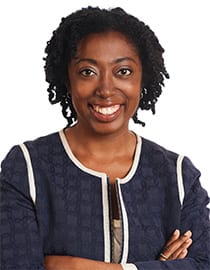By Andrew Cohen

Rachel Johnson-Farias ’12 knows that her only option as the new executive director of Berkeley Law’s Center on Reproductive Rights & Justice is to hit the ground running.
Pressing issues include America’s teenage pregnancy rate being notably higher than in other developed countries, and women of color facing disproportionate barriers to obtaining health insurance, contraceptives, and quality care during pregnancy and childbirth.
A Guttmacher Institute report cites 29 states as hostile to abortion rights, with 11 states enacting 22 new restrictions in the first half of this year. Brett Kavanaugh joining the U.S. Supreme Court may further affect abortion access and ongoing litigation, possibly granting states more latitude to impose restrictions and potentially jeopardizing Roe v. Wade.
The first think tank of its kind, CRRJ contributes research in a wide range of areas, supports law and policy advocacy, and tries to influence legal and social science discourse.
The center published non-partisan analyses that contributed to the budgetary repeal of California’s welfare family cap in 2016, and produced the first law school textbook on reproductive rights and justice issues in 2014. Seeking to bridge the academic-advocate divide, it also curated, launched, and expanded the first online collection of reproductive resources.
While a Berkeley Law student, Johnson-Farias won the Francine Diaz Memorial Award for her commitment to social justice. After graduating, she earned an Equal Justice Works Fellowship to implement a juvenile reentry program at the East Bay Community Law Center. She later won an Echoing Green Fellowship and the J.M. Kaplan Fund Prize to create Esq. Apprentice, a nonprofit that offers a free legal profession apprenticeship program to low-income people of color.
Johnson-Farias recently discussed her vision for CRRJ, its upcoming challenges, and returning to her alma mater.
What sparked your interest in this position?
I’ve been a reproductive justice advocate since I can remember. I sat on the board of the Berkeley chapter of If/When/How (formerly Law Students for Reproductive Justice) while a student. My first law job was working in California women’s prisons at the intersections of reproductive justice and criminal law. Personally and professionally, the reproductive justice frame informs my advocacy at every turn, and when this position became available, I jumped at the chance to be considered.
What are your top projects and priorities for the center?
In addition to CRRJ’s ongoing initiative to abolish welfare family caps, I’m really interested in investigating policies leading to poor maternal health outcomes; especially for black mothers. Additionally, crucial to realizing reproductive justice for all is removing barriers to meaningful choice. Poverty is one such barrier and CRRJ seeks to create policy proposals that encourage pipelines out of poverty for low-income women with apprenticeship at the core.
What aspects of reproductive justice are most misunderstood and how can CRRJ help counteract those misconceptions?
Reproductive justice is realized when we can genuinely enjoy the right to have a family or not, and have the ability to raise our families with dignity. For so many, conversations about reproductive justice are reduced to conversations about abortion. Ready access to abortion is key to ensuring reproductive freedom, but abortion is a part of a larger conversation around choice and personal liberty. That should be central in any reproductive justice policy decision. CRRJ holds reproductive freedom at the center of policy conversations and works to ensure that those most negatively impacted by reproductive justice policies have the research and data necessary to bring their stories from the margins to the center.
With the new makeup of the Supreme Court, how concerned are you that Roe v. Wade may give way to state-by-state laws?
It’s a big concern. Even in situations where precedent dictates protections, the new makeup of the Supreme Court is likely to embolden politicians to repeat previously denied policies and worse. I know how seriously most judges hold their ethical responsibility and so I am ultimately optimistic that many of the more egregious laws won’t be upheld in the end. My concern is for the countless women who will suffer as the judicial process drags on.
How do students contribute to the center’s work?
Students provide essential research that directly informs CRRJ’s policy recommendations. Earlier this year, students helped research and draft an amicus brief challenging the Hyde Amendment that was upheld in Harris v. McRae and encouraging Maine courts to disregard the harmful Hyde Amendment as unconstitutional.
Why is collaborating with outside organizations vital to maximizing CRRJ’s impact?
Partnership with community organizations working in low-income communities is essential for two reasons: (1) Organizations working with marginalized populations are uniquely informed on what policy questions to ask based on the direct services they provide and; (2) once CRRJ generates policy proposals, our partner organizations are essential to improving proposals and making them law.
What is it like returning to Berkeley Law, and what were your most meaningful experiences as a student?
Well, the physical space is certainly different. I often look up and am lost, but I’m getting more and more situated with time. Hands down, the most valuable activity I did here was clinical work. If it weren’t for providing direct services to real people, the law would not have made much sense to me. I started as a 1L in the Workers’ Rights Clinic and moved on to EBCLC in the Clean Slate unit. Those early experiences helped bring the law into focus for me and I continue to draw on those times as a lawyer today.